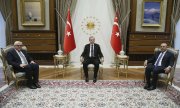Frosty atmosphere during Steinmeier's Ankara visit
During a visit by German Foreign Minister Frank-Walter Steinmeier to Ankara Turkey's foreign minister Mevlüt Çavuşoğlu accused Berlin on Tuesday of supporting PKK terrorists and the Gülen movement. For his part Steinmeier called for more respect for human rights. Shortly before this President Erdoğan had alluded to the possibility of holding a referendum on Turkey breaking off its EU accession talks. Is this the end of the EU-Turkey relationship?
Neither EU nor Turkey ready for accession
In the current situation resuming the EU accession talks doesn't make sense, writes tagesschau.de:
“If Turkey wants to continue negotiating at all, Europe quite rightly wants to see improvements as regards the rule of law and freedom of opinion instead of constant deterioration. Equally justified is Turkey's desire to know where it stands. Would the EU let a Turkey with a functioning constitutional state and democracy join? Europe can't provide an answer because Europe deceived not only the Turks but also itself. As long as accession is unrealistic for formal reasons, they can talk about it as much as they like. … Steinmeier and Çavuşoğlu defended their own positions and criticised each other's. But this failed to have the expected liberating effect. The conversation between the two foreign ministers served above all to highlight how much Germany and Turkey have grown apart.”
Twilight of a difficult relationship
President Erdoğan indicated on Monday that Turkey may hold a referendum on breaking off the EU accession negotiations. That would be the end of a tragic tale, Hürriyet Daily News sighs:
“The AKP, which began its political life by crying out 'reform, freedoms and rights' in the face of an authoritarian establishment, soon began to build its own authoritarian establishment. EU norms, which looked like a saviour before, now looked like an annoying 'tutelage'. That is why the AKP developed an increasingly fierce anti-Western narrative, condemning the very norms that saved itself in the past as imperialist meddling in 'our domestic affairs'. This does not mean that EU representatives have always done the right thing to improve the relationship. In most cases, they were right to criticize the government’s authoritarianism, but they sometimes turned a blind eye to other troubling dynamics and actors, proving themselves less informed and relevant.”

